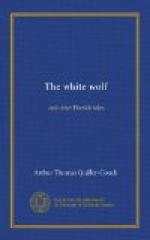Here the story-teller broke off as a rider upon a grey horse came at a foot-pace round the slope of Burrator below us and passed on without seeing. It was the Rajah, returning solitary from the hunt, and his eyes were still fastened ahead of him.
“Ah, great man! England is a weary hole for the likes of you and me. It’s here they talk of the East, but we have loved it and hated it and known it, and remember. Our eyes have seen—our eyes have seen.”
He stood up, pulled himself together with a kind of shiver, and suddenly shambled away across the slope, having said no good-bye, but leaving me there at gaze.
VICTOR.
I.
“You will ruin his life,” said one of the two women. As the phrase escaped her she remembered, or seemed to remember, having met with it in half a dozen novels. She had nerved herself for the interview which up to this moment had been desperately real; but now she felt herself losing grip. It had all happened before . . . somewhere; she was reacting an old scene, going through a part; the four or five second-hand words gave her this sensation. Then she reflected that the other woman, too, had perhaps met them before in some cheap novelette, and, being an uneducated person, would probably find them the more impressive for that.
The other woman had in fact met them before, in the pages of Bow Bells, and been impressed by them. But since then love had found her ignorant and left her wise; wiser than in her humiliation she dared to guess, and yet the wiser for being humiliated. She answered in a curiously dispassionate voice: “I think, miss, his life is ruined already; that is, if he sent you to say all this to me.”
“He did not.” Miss Bracy lifted the nose and chin which she inherited from several highly distinguished Crusaders, and gave the denial sharply and promptly, looking her ex-maid straight in the face. She had never— to use her own words—stood any nonsense from Bassett.
But Bassett, formerly so docile (though, as it now turned out, so deceitful); who had always known her place and never answered her mistress but with respect; was to-day an unrecognisable Bassett—not in the least impudent, but as certainly not to be awed or brow-beaten. Standing in the glare of discovered misconduct, under the scourge of her shame, the poor girl had grasped some secret strength which made her invincible.
“But I think, miss,” she answered, “Mr. Frank must have known you was coming.” And this Miss Bracy could not deny. She had never told a lie in her life.
“It is very likely—no, it is certain—that he guessed,” she admitted.
“And if so, it comes to the same thing,” Bassett persisted, with a shade of weariness in her voice.
“You ungrateful girl! You ungrateful and quite extraordinary girl! First you inveigle that poor boy at the very outset of his career, and then when upon a supposed point of honour he offers to marry you—”




